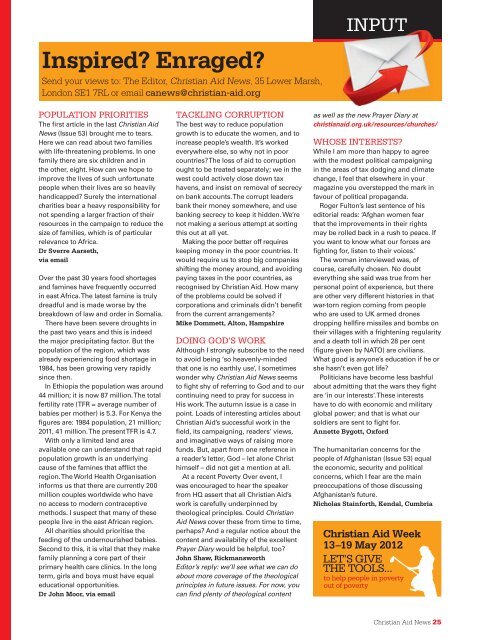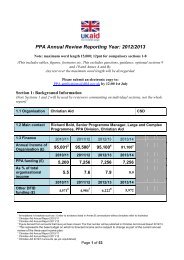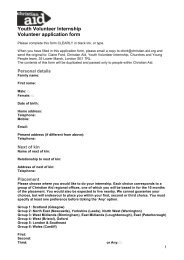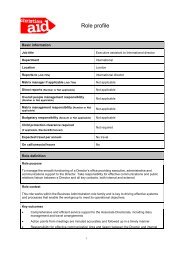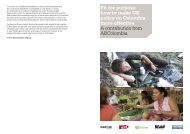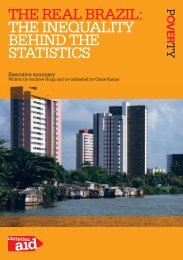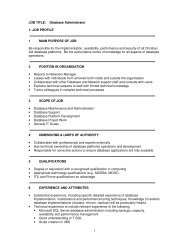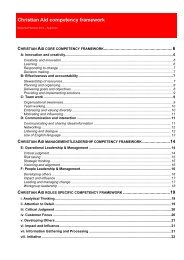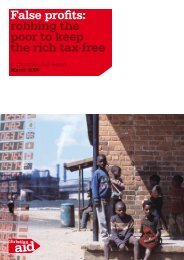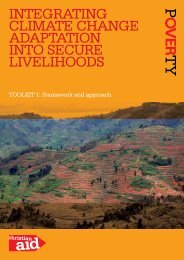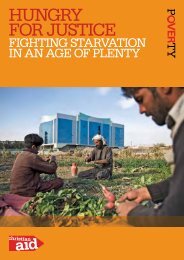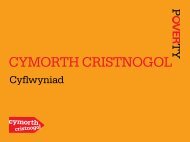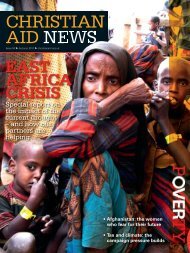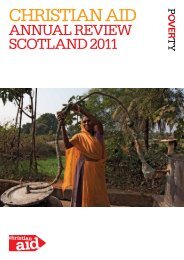CHRISTIAN AID NEWS
CHRISTIAN AID NEWS
CHRISTIAN AID NEWS
Create successful ePaper yourself
Turn your PDF publications into a flip-book with our unique Google optimized e-Paper software.
Inspired Enraged<br />
Send your views to: The Editor, Christian Aid News, 35 Lower Marsh,<br />
London SE1 7RL or email canews@christian-aid.org<br />
INPUT<br />
POPULATION PRIORITIES<br />
The first article in the last Christian Aid<br />
News (Issue 53) brought me to tears.<br />
Here we can read about two families<br />
with life-threatening problems. In one<br />
family there are six children and in<br />
the other, eight. How can we hope to<br />
improve the lives of such unfortunate<br />
people when their lives are so heavily<br />
handicapped Surely the international<br />
charities bear a heavy responsibility for<br />
not spending a larger fraction of their<br />
resources in the campaign to reduce the<br />
size of families, which is of particular<br />
relevance to Africa.<br />
Dr Sverre Aarseth,<br />
via email<br />
Over the past 30 years food shortages<br />
and famines have frequently occurred<br />
in east Africa. The latest famine is truly<br />
dreadful and is made worse by the<br />
breakdown of law and order in Somalia.<br />
There have been severe droughts in<br />
the past two years and this is indeed<br />
the major precipitating factor. But the<br />
population of the region, which was<br />
already experiencing food shortage in<br />
1984, has been growing very rapidly<br />
since then.<br />
In Ethiopia the population was around<br />
44 million; it is now 87 million. The total<br />
fertility rate (TFR = average number of<br />
babies per mother) is 5.3. For Kenya the<br />
figures are: 1984 population, 21 million;<br />
2011, 41 million. The present TFR is 4.7.<br />
With only a limited land area<br />
available one can understand that rapid<br />
population growth is an underlying<br />
cause of the famines that afflict the<br />
region. The World Health Organisation<br />
informs us that there are currently 200<br />
million couples worldwide who have<br />
no access to modern contraceptive<br />
methods. I suspect that many of these<br />
people live in the east African region.<br />
All charities should prioritise the<br />
feeding of the undernourished babies.<br />
Second to this, it is vital that they make<br />
family planning a core part of their<br />
primary health care clinics. In the long<br />
term, girls and boys must have equal<br />
educational opportunities.<br />
Dr John Moor, via email<br />
TACKLING CORRUPTION<br />
The best way to reduce population<br />
growth is to educate the women, and to<br />
increase people’s wealth. It’s worked<br />
everywhere else, so why not in poor<br />
countries The loss of aid to corruption<br />
ought to be treated separately; we in the<br />
west could actively close down tax<br />
havens, and insist on removal of secrecy<br />
on bank accounts. The corrupt leaders<br />
bank their money somewhere, and use<br />
banking secrecy to keep it hidden. We’re<br />
not making a serious attempt at sorting<br />
this out at all yet.<br />
Making the poor better off requires<br />
keeping money in the poor countries. It<br />
would require us to stop big companies<br />
shifting the money around, and avoiding<br />
paying taxes in the poor countries, as<br />
recognised by Christian Aid. How many<br />
of the problems could be solved if<br />
corporations and criminals didn’t benefit<br />
from the current arrangements<br />
Mike Dommett, Alton, Hampshire<br />
DOING GOD’S WORK<br />
Although I strongly subscribe to the need<br />
to avoid being ‘so heavenly-minded<br />
that one is no earthly use’, I sometimes<br />
wonder why Christian Aid News seems<br />
to fight shy of referring to God and to our<br />
continuing need to pray for success in<br />
His work. The autumn issue is a case in<br />
point. Loads of interesting articles about<br />
Christian Aid’s successful work in the<br />
field, its campaigning, readers’ views,<br />
and imaginative ways of raising more<br />
funds. But, apart from one reference in<br />
a reader’s letter, God – let alone Christ<br />
himself – did not get a mention at all.<br />
At a recent Poverty Over event, I<br />
was encouraged to hear the speaker<br />
from HQ assert that all Christian Aid’s<br />
work is carefully underpinned by<br />
theological principles. Could Christian<br />
Aid News cover these from time to time,<br />
perhaps And a regular notice about the<br />
content and availability of the excellent<br />
Prayer Diary would be helpful, too<br />
John Shaw, Rickmansworth<br />
Editor’s reply: we’ll see what we can do<br />
about more coverage of the theological<br />
principles in future issues. For now, you<br />
can find plenty of theological content<br />
as well as the new Prayer Diary at<br />
christianaid.org.uk/resources/churches/<br />
WHOSE INTERESTS<br />
While I am more than happy to agree<br />
with the modest political campaigning<br />
in the areas of tax dodging and climate<br />
change, I feel that elsewhere in your<br />
magazine you overstepped the mark in<br />
favour of political propaganda.<br />
Roger Fulton’s last sentence of his<br />
editorial reads: ‘Afghan women fear<br />
that the improvements in their rights<br />
may be rolled back in a rush to peace. If<br />
you want to know what our forces are<br />
fighting for, listen to their voices.’<br />
The woman interviewed was, of<br />
course, carefully chosen. No doubt<br />
everything she said was true from her<br />
personal point of experience, but there<br />
are other very different histories in that<br />
war-torn region coming from people<br />
who are used to UK armed drones<br />
dropping hellfire missiles and bombs on<br />
their villages with a frightening regularity<br />
and a death toll in which 28 per cent<br />
(figure given by NATO) are civilians.<br />
What good is anyone’s education if he or<br />
she hasn’t even got life<br />
Politicians have become less bashful<br />
about admitting that the wars they fight<br />
are ‘in our interests’. These interests<br />
have to do with economic and military<br />
global power; and that is what our<br />
soldiers are sent to fight for.<br />
Annette Bygott, Oxford<br />
The humanitarian concerns for the<br />
people of Afghanistan (Issue 53) equal<br />
the economic, security and political<br />
concerns, which I fear are the main<br />
preoccupations of those discussing<br />
Afghanistan’s future.<br />
Nicholas Stainforth, Kendal, Cumbria<br />
Christian Aid News 25


